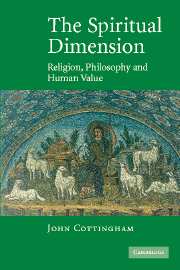Book contents
- Frontmatter
- Contents
- Preface and acknowledgements
- 1 Religion and spirituality: from praxis to belief
- 2 Religion and science: theodicy in an imperfect universe
- 3 Religion and value: the problem of heteronomy
- 4 Religion and self-discovery: the interior journey
- 5 Religion and language: emotion, symbol, and fact
- 6 Religion and the Enlightenment: modernist and postmodernist obstacles
- 7 Religion and the good life: the epistemic and moral resources of spirituality
- 8 Religion and pluralism: which spirituality?
- Bibliography
- Index
4 - Religion and self-discovery: the interior journey
Published online by Cambridge University Press: 24 November 2009
- Frontmatter
- Contents
- Preface and acknowledgements
- 1 Religion and spirituality: from praxis to belief
- 2 Religion and science: theodicy in an imperfect universe
- 3 Religion and value: the problem of heteronomy
- 4 Religion and self-discovery: the interior journey
- 5 Religion and language: emotion, symbol, and fact
- 6 Religion and the Enlightenment: modernist and postmodernist obstacles
- 7 Religion and the good life: the epistemic and moral resources of spirituality
- 8 Religion and pluralism: which spirituality?
- Bibliography
- Index
Summary
Πρóσεχε σεαυτῷ μή γένηται ῥῆμα κρυπτòν έν τῇ καρδìᾳ σου. (‘Give heed to yourself, lest there be a hidden word in your heart’).
Basil of CaesareaA TRIANGLE OF TENSION
I spoke in Chapter 1 of the vital role played by spiritual praxis in the development of a religious outlook, and also of its importance from a philosophical point of view, in the project of understanding the nature of religion. Practical engagement alone, however, is clearly not a sufficient condition for having a religious allegiance: as discussed in Chapter 2, adherence to a religion involves adopting a worldview that needs to be at least consistent with the character of the universe as we find it – and here again philosophy becomes involved, since examining such consistency relations is in large part a philosophical task. Finally, as explored in Chapter 3, a religious outlook is integrally bound up with certain moral commitments; and (at least in theistic traditions) this immediately raises higher-order philosophical questions of how the domain of morality is related to the transcendent reality which is claimed to be its ultimate source.
From the results so far, it is clear that there is a pretty close relationship between the domain of religion and that of philosophy. This is not, of course, to imply that all religious people have to get involved in philosophical inquiry; but nevertheless the kind of critical reflective analysis that philosophy provides is probably increasingly indispensable for anyone who wishes to hold on to a religious outlook, at least in the highly intellectualised and science-dominated culture of the western world.
- Type
- Chapter
- Information
- The Spiritual DimensionReligion, Philosophy and Human Value, pp. 58 - 78Publisher: Cambridge University PressPrint publication year: 2005

